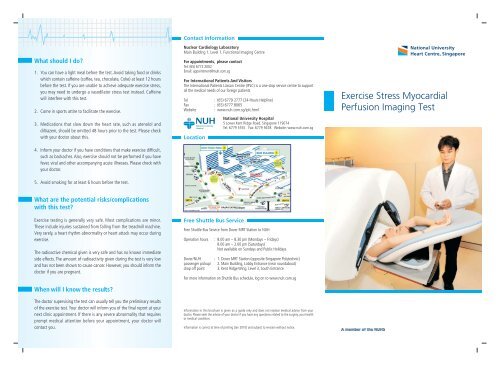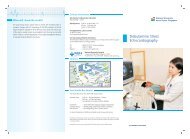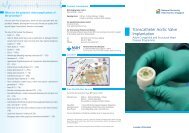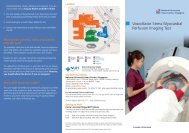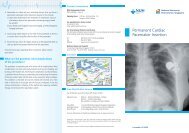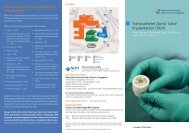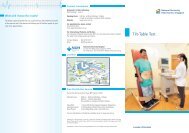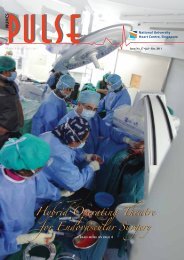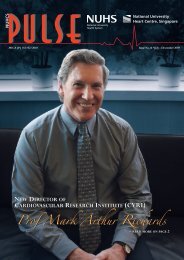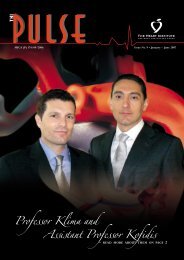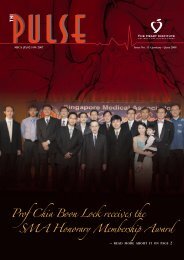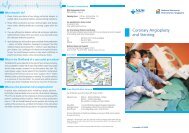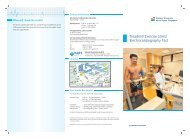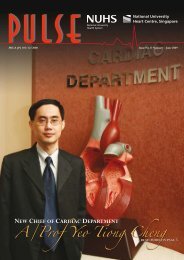Exercise Stress Myocardial Perfusion Imaging Test - nuhcs
Exercise Stress Myocardial Perfusion Imaging Test - nuhcs
Exercise Stress Myocardial Perfusion Imaging Test - nuhcs
- No tags were found...
Create successful ePaper yourself
Turn your PDF publications into a flip-book with our unique Google optimized e-Paper software.
What should I do?1. You can have a light meal before the test. Avoid taking food or drinkswhich contain caffeine (coffee, tea, chocolate, Coke) at least 12 hoursbefore the test. If you are unable to achieve adequate exercise stress,you may need to undergo a vasodilator stress test instead. Caffeinewill interfere with this test.2. Come in sports attire to facilitate the exercise.3. Medications that slow down the heart rate, such as atenolol anddiltiazem, should be omitted 48 hours prior to the test. Please checkwith your doctor about this.4. Inform your doctor if you have conditions that make exercise difficult,such as backaches. Also, exercise should not be performed if you havefever, viral and other accompanying acute illnesses. Please check withyour doctor.Contact informationNuclear Cardiology LaboratoryMain Building 1, Level 1, Functional <strong>Imaging</strong> CentreFor appointments, please contactTel: (65) 6772 2002Email: appointment@nuh.com.sgFor International Patients And VisitorsThe International Patients Liaison Centre (IPLC) is a one-stop service centre to supportall the medical needs of our foreign patientsTel: (65) 6779 2777 (24-Hours Helpline)Fax : (65) 6777 8065Website : www.nuh.com.sg/iplc.htmlLocationNational University Hospital5 Lower Kent Ridge Road, Singapore 119074Tel: 6779 5555 Fax: 6779 5678 Website: www.nuh.com.sg<strong>Exercise</strong> <strong>Stress</strong> <strong>Myocardial</strong><strong>Perfusion</strong> <strong>Imaging</strong> <strong>Test</strong>5. Avoid smoking for at least 6 hours before the test.What are the potential risks/complicationswith this test?<strong>Exercise</strong> testing is generally very safe. Most complications are minor.These include injuries sustained from falling from the treadmill machine.Very rarely, a heart rhythm abnormality or heart attack may occur duringexercise.The radioactive chemical given is very safe and has no known immediateside effects. The amount of radioactivity given during the test is very lowand has not been shown to cause cancer. However, you should inform thedoctor if you are pregnant.When will I know the results?The doctor supervising the test can usually tell you the preliminary resultsof the exercise test. Your doctor will inform you of the final report at yournext clinic appointment. If there is any severe abnormality that requiresprompt medical attention before your appointment, your doctor willcontact you.Free Shuttle Bus ServiceFree Shuttle Bus Service from Dover MRT Station to NUHOperation hours: 8.00 am – 8.30 pm (Mondays – Fridays)8.00 am – 2.00 pm (Saturdays)Not available on Sundays and Public HolidaysDover/NUH : 1. Dover MRT Station (opposite Singapore Polytechnic)passenger pickup/ 2. Main Building, Lobby Entrance (near roundabout)drop off point 3. Kent Ridge Wing, Level 3, South EntranceFor more information on Shuttle Bus schedule, log on to www.nuh.com.sgInformation in this brochure is given as a guide only and does not replace medical advice from yourdoctor. Please seek the advice of your doctor if you have any questions related to the surgery, your healthor medical condition.Information is correct at time of printing (Jan 2010) and subject to revision without notice.
What is exercise stress myocardial perfusionimaging test?Blood vessels supplying the heart with blood can be abnormally narrowedby a process called atherosclerosis. When this happens, the blood flow tothe heart may be insufficient during physical exertion. <strong>Exercise</strong> stressmyocardial perfusion test assesses the blood flow (perfusion) to the heartmuscles (myocardium) during exercise.In our laboratory, we employ treadmill exercise to stress the heart. Duringtreadmill exercise, the level of exercise gradually increases until the patient’sheart-rate reaches a certain target. At this time, a very small amount ofradioactive chemical (usually technetium or thallium) is injected into thepatient. This is taken up by the heart and gives your doctors informationabout the blood-flow.What is the purpose of the test?This test assesses the blood flow (perfusion) to the heart. It also gives thedoctor an indication of how strongly the heart is beating (the EjectionFraction). These are the 2 most important pieces of information a doctorneeds when evaluating a patient with heart disease.This test is more accurate and gives more information than treadmill stresstests alone.What can I expect?The test is performed in the Nuclear Cardiology Laboratory. This test consistsof 2 phases – the stress phase and the rest phase, both of which are usuallydone on the same day. The stress test is usually performed first.Before the test, your height and weight will be taken and a small plasticcannula is inserted in one of the veins on your hand for injection of theradioactive chemical. Male patients will be asked to remove their shirts tofacilitate the attachment of ECG wires to the chest. Women may be askedto change into special gowns for this purpose.Once your blood pressure and a baseline ECG is recorded, you will thenproceed with the exercise. Most commonly, the speed and incline of themachine will increase every 3 minutes. Throughout the test, your ECG andblood pressure will be monitored. If you experience any symptoms with theexercise, you must inform the technologist or doctor supervising the test.The doctor will inject the radioactive chemical into your vein once you reachyour target heart rate. You must continue to exercise on the treadmill forone to two minutes after injection to facilitate circulation of the chemical.After the exercise, you will continue to be monitored for a few minutesduring the recovery period.<strong>Myocardial</strong> perfusion images acquired by the gamma camera (left)Following this first scan, you will need to wait for about 4 hours beforethe rest phase of the test. During this waiting period, you are allowed toleave the laboratory and have some refreshments, but must return at theappointed time. Upon your return, another injection of the radioactivechemical will be given. The second (rest) scan of your heart will be acquiredabout 45 minutes after this injection. With the conclusion of this secondscan, the test is complete.Sometimes, the test may be performed over 2 days, or the rest phase maybe conducted first. You will be given specific instructions if there is anyvariation from the above routine. Please ask any of the attending staff ifyou have any questions.You will next rest for about 30 to 45 minutes during which you can havea drink. After this, it will be time to take images of your heart. You will liefacing upwards while the gamma-camera scans your heart. You should relaxand lie fairly still so that accurate pictures can be obtained. The process willtake 15 minutes.


